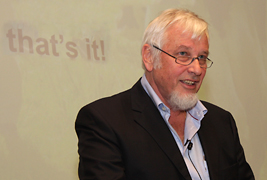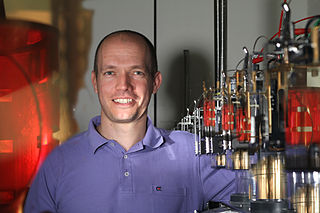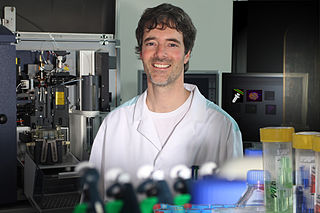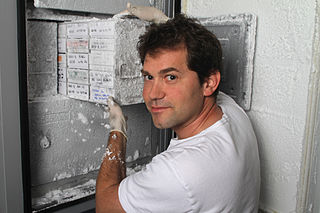
The University of Basel is a university in Basel, Switzerland. Founded on 4 April 1460, it is Switzerland's oldest university and among the world's oldest surviving universities. The university is traditionally counted among the leading institutions of higher learning in the country.

Gottfried Schatz was a Swiss-Austrian biochemist.

The Friedrich Miescher Institute for Biomedical Research (FMI) is a biomedical research institute founded in 1970. Based in Basel, Switzerland, the FMI is affiliated with the University of Basel and the Novartis Institutes for BioMedical Research (NIBR). It is named after Friedrich Miescher. As of 2021, the FMI has around 340 collaborators, of which 20 are research group leaders, over 80 are postdoctoral collaborators and over 80 are postgraduate students participating in the FMI International PhD Program. The FMI is directed by Dirk Schübeler.

The Biozentrum of the University of Basel specializes in basic molecular and biomedical research and teaching. Research includes the areas of cell growth and development, infection biology, neurobiology, structural biology and biophysics, and computational and systems biology. With 500 employees, the Biozentrum is the largest department at the University of Basel's Faculty of Science. It is home to 30 research groups with scientists from more than 40 nations.

Ueli Aebi is a Swiss structural biologist and co-founder of the Maurice E. Müller Institute for Structural Biology at the Biozentrum University of Basel.

Guy R. Cornelis is a Belgian microbiologist.

Markus Affolter is a Swiss Developmental Biologist and Professor at the Biozentrum University of Basel, Switzerland.

Urs Jenal is a Swiss Microbiologist and Professor at the Biozentrum University of Basel, Switzerland.

Anne Spang is a German Biochemist/Cell Biologist and Professor at the Biozentrum University of Basel, Switzerland.

Silvia Arber is a Swiss neurobiologist. She teaches and researches at both the Biozentrum of the University of Basel and the Friedrich Miescher Institute for Biomedical Research in Basel Switzerland.

Christoph Handschin is a Swiss cell biologist at the Biozentrum University of Basel.

Michael Nip Hall is an American-Swiss molecular biologist and professor at the Biozentrum University of Basel, Switzerland.

Joachim Heinrich Seelig is a German physical chemist and specialist in NMR Spectroscopy. He is one of the founding fathers of the Biozentrum of the University of Basel.

Tilman Schirmer is a structural biologist and Professor at the Biozentrum of the University of Basel.

Martin Spiess is a Swiss Biochemist and former professor at the Biozentrum University of Basel, Switzerland.

Dirk Bumann is a German infection biologist and professor at the Biozentrum of the University of Basel, Switzerland.

Roderick Y. H. Lim is a Singaporean nano- and biophysicist at the Biozentrum of the University of Basel, Switzerland.
Susan M. Gasser is a Swiss molecular biologist. She was the Director of the Friedrich Miescher Institute for Biomedical Research in Basel, Switzerland, from 2004 - 2019, where she also led a research group from 2004 until 2021. She was in parallel Professor of molecular biology at the University of Basel until April 2021. Since January 2021, Susan Gasser is Director of the ISREC Foundation, based in Lausanne, and is Professor invité at the University of Lausanne in the Department of Fundamental Microbiology. She is an expert in quantitative biology and studies epigenetic inheritance and genome stability.

Peter Scheiffele is a German neurobiologist who conducts research at the Biozentrum of the University of Basel, Switzerland.

Prisca Liberali is an Italian chemist who is a senior group leader at the Friedrich Miescher Institute for Biomedical Research. Her research takes a systems biology approach to understand the behaviour of multi-cellular systems. She was awarded the European Molecular Biology Organization gold medal in 2022.



















